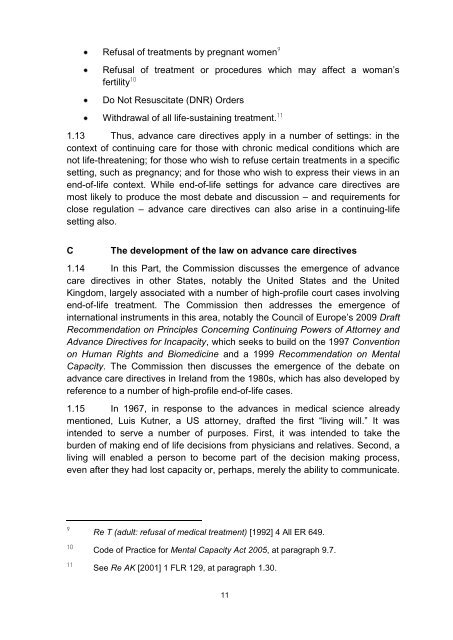Report on Bioethics: Advance Care Directives - Law Reform ...
Report on Bioethics: Advance Care Directives - Law Reform ...
Report on Bioethics: Advance Care Directives - Law Reform ...
You also want an ePaper? Increase the reach of your titles
YUMPU automatically turns print PDFs into web optimized ePapers that Google loves.
Refusal of treatments by pregnant women 9Refusal of treatment or procedures which may affect a woman‘sfertility 10Do Not Resuscitate (DNR) OrdersWithdrawal of all life-sustaining treatment. 111.13 Thus, advance care directives apply in a number of settings: in thec<strong>on</strong>text of c<strong>on</strong>tinuing care for those with chr<strong>on</strong>ic medical c<strong>on</strong>diti<strong>on</strong>s which arenot life-threatening; for those who wish to refuse certain treatments in a specificsetting, such as pregnancy; and for those who wish to express their views in anend-of-life c<strong>on</strong>text. While end-of-life settings for advance care directives aremost likely to produce the most debate and discussi<strong>on</strong> – and requirements forclose regulati<strong>on</strong> – advance care directives can also arise in a c<strong>on</strong>tinuing-lifesetting also.CThe development of the law <strong>on</strong> advance care directives1.14 In this Part, the Commissi<strong>on</strong> discusses the emergence of advancecare directives in other States, notably the United States and the UnitedKingdom, largely associated with a number of high-profile court cases involvingend-of-life treatment. The Commissi<strong>on</strong> then addresses the emergence ofinternati<strong>on</strong>al instruments in this area, notably the Council of Europe‘s 2009 DraftRecommendati<strong>on</strong> <strong>on</strong> Principles C<strong>on</strong>cerning C<strong>on</strong>tinuing Powers of Attorney and<strong>Advance</strong> <strong>Directives</strong> for Incapacity, which seeks to build <strong>on</strong> the 1997 C<strong>on</strong>venti<strong>on</strong><strong>on</strong> Human Rights and Biomedicine and a 1999 Recommendati<strong>on</strong> <strong>on</strong> MentalCapacity. The Commissi<strong>on</strong> then discusses the emergence of the debate <strong>on</strong>advance care directives in Ireland from the 1980s, which has also developed byreference to a number of high-profile end-of-life cases.1.15 In 1967, in resp<strong>on</strong>se to the advances in medical science alreadymenti<strong>on</strong>ed, Luis Kutner, a US attorney, drafted the first ―living will.‖ It wasintended to serve a number of purposes. First, it was intended to take theburden of making end of life decisi<strong>on</strong>s from physicians and relatives. Sec<strong>on</strong>d, aliving will enabled a pers<strong>on</strong> to become part of the decisi<strong>on</strong> making process,even after they had lost capacity or, perhaps, merely the ability to communicate.91011Re T (adult: refusal of medical treatment) [1992] 4 All ER 649.Code of Practice for Mental Capacity Act 2005, at paragraph 9.7.See Re AK [2001] 1 FLR 129, at paragraph 1.30.11
















